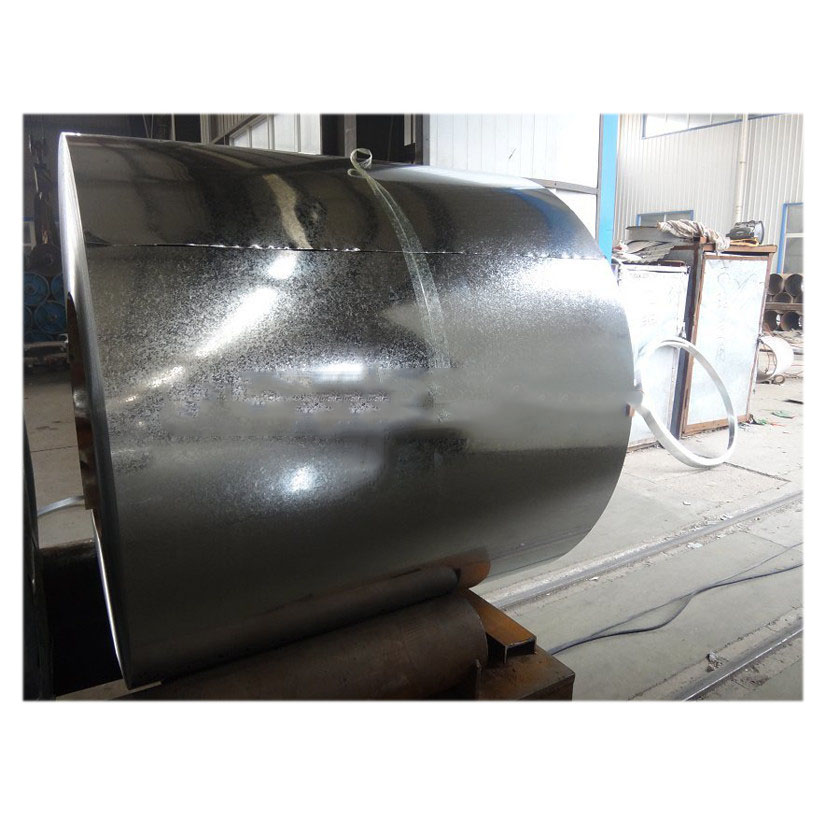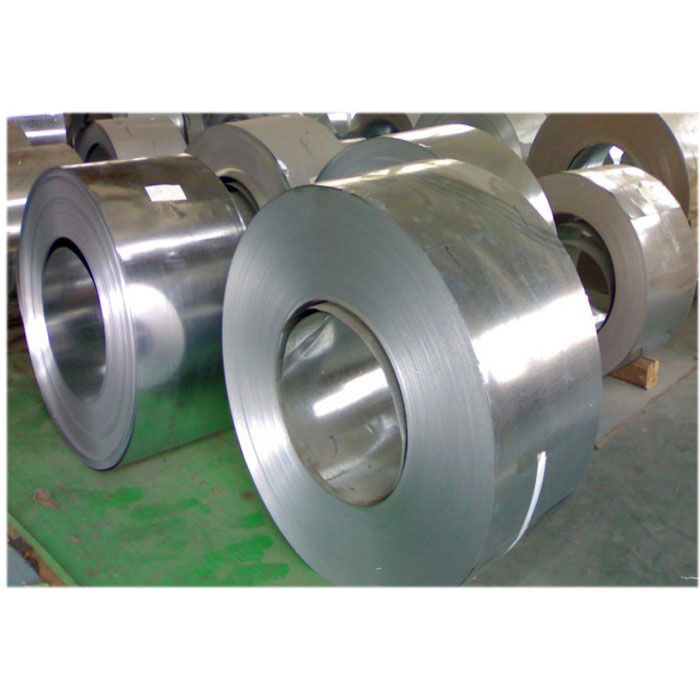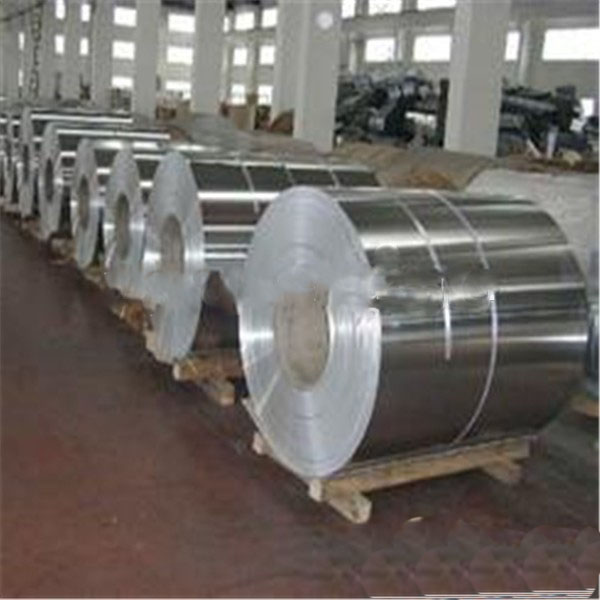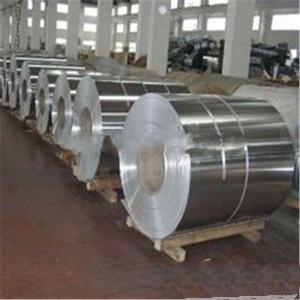Galvanized Steel Coil High Quality
- Loading Port:
- Qingdao
- Payment Terms:
- TT or LC
- Min Order Qty:
- 1000 PCS
- Supply Capability:
- 20000 PCS/month
OKorder Service Pledge
OKorder Financial Service
You Might Also Like
OKorder is offering High Quality Galvanized Steel Coil at great prices with worldwide shipping. Our supplier is a world-class manufacturer of galvanized steel and one of the largest production bases in northern China with a strong technical workforce and advanced equipment. We have supplied more than 400000 metric tons of galvanized steel annually worldwide utilizing two full production lines.
The intended use of High Quality Galvanized Steel Coil
Our High Quality Galvanized Steel Coil is ideal for:
Fabricating applications
Manufacturing applications
The advantages of our High Quality Galvanized Steel Coil
Not only is OKorder's High Quality Galvanized Steel Coil of the highest quality and reliability, we are able to quickly ship orders within 20 days of receiving a deposit or original L/C. We also offer training with experienced engineers to ease installation. Products are designed according to customer requirements and are all durable, boast high stiffness and load-bearing qualities, and are recyclable. All products are shipped with ISO9001 & SGS certification as well as JIS 3302, ASTM A653, EN10143 standards.
Main features of High Quality Galvanized Steel Coil
Additional OEM casting and forging services available
Shipped within 20 Days TT or LC at Sight
FAQ:
Q1: Why buy Materials & Equipment from OKorder.com?
A: All products offered byOKorder.com are carefully selected from China's most reliable manufacturing enterprises. Through its ISO certifications, OKorder.com adheres to the highest standards and a commitment to supply chain safety and customer satisfaction.
Q2: How is our High Quality Galvanized Steel Coil manufactured?
A: Our products are manufactured strictly according to national and international standards, with tests conducted on every product before delivery. Our quality certifications and test reports are available upon request.
Q3: Are products guaranteed?
A: If a product's quality does not match the description provided prior to your order, OKorder offers a full refund.
Q4: Why should you choose us?
A: Sourcing decisions are made based on quality, and then price. We can provide you with both. Additionally, we offer professional product inquiries, product knowledge training (for agents), rapid delivery with factories located near ports and convenient transportation.
Specifications:
Thickness: 0.14mm – 4.5mm TCT
Width: 20mm – 150mm
Individual Weight: 3 – 20MT
Surface Finish: Chromated, skin pass, oiled, slightly oiled, dry, fingerprint-resistant
Surface structure: Zero spangle, minimized spangle, regular spangle, large spangle
Coil ID: 508mm or 610mm
Coating: 40-500g/m² Zinc
Steel Grade: DX51D / DX52D / DX53D / S250, 280, 320GD
Standard: JIS 3302, ASTM A653, EN10143
Temper:
Full Hard: 95 HRB, G500 – G550
Commercial Quality: 70 HRB, G300 – G350
Images:



- Q:What is the average tensile strength of a steel coil?
- The average tensile strength of a steel coil can vary depending on the specific type and grade of steel being used. However, on average, steel coils tend to have a tensile strength ranging from 300 to 2,000 megapascals (MPa).
- Q:How are steel coils used in the production of agricultural systems?
- Due to their durability and strength, steel coils are frequently employed in the production of agricultural systems. Specifically, these coils are commonly utilized in the creation of machinery and equipment essential for agricultural operations. One prevalent use of steel coils lies in the manufacture of farming machinery such as tractors, plows, and cultivators. These machines necessitate robust components capable of enduring the challenging conditions present in the agricultural environment. Steel coils are employed to fabricate the frames, chassis, and other structural parts of these machines, providing the necessary strength and support. Additionally, steel coils are employed in the creation of irrigation systems, which play a crucial role in efficient water management within agriculture. These coils are employed in the construction of pipes, valves, and fittings, ensuring the durability and long-lasting nature of the irrigation system. Furthermore, steel coils are employed to fabricate storage tanks and silos, which serve as vital tools for storing and preserving agricultural products like grains, seeds, and fertilizers. Moreover, steel coils find application in the construction of greenhouses and agricultural buildings. These coils are used to fabricate the structural framework, providing stability and resistance against environmental factors. Steel coils are also employed in the production of fencing and enclosures to safeguard crops and livestock from external threats. In conclusion, steel coils play a significant role in the production of agricultural systems by delivering the necessary strength, durability, and stability required for farming machinery, irrigation systems, storage facilities, and agricultural structures. Their utilization ensures that these systems can withstand the demanding conditions of the agricultural industry and contribute to efficient and sustainable farming practices.
- Q:What are the benefits of using steel coils in the manufacturing of pipes?
- There are several benefits of using steel coils in the manufacturing of pipes: 1. Strength and durability: Steel is known for its strength and durability, making it an ideal material for pipes. Steel coils provide a strong foundation for pipes, ensuring they can withstand high-pressure applications and resist damage from external factors such as impact or corrosion. This strength and durability enhance the longevity of the pipes, reducing the need for frequent replacements. 2. Flexibility: Steel coils offer flexibility in terms of customization and design. They can be easily formed into various pipe shapes and sizes, allowing manufacturers to produce pipes that meet specific project requirements. This flexibility also enables the production of seamless pipes, which have superior structural integrity and reduced risk of leakage. 3. Thermal resistance: Steel has excellent thermal conductivity, meaning it can efficiently transfer heat or cold. This property is crucial for pipes used in industries such as oil and gas, where temperature control is essential. Steel coils enable the manufacturing of pipes that can effectively handle extreme temperatures, preventing any damage to the pipes or the substances flowing through them. 4. Cost-effectiveness: Steel coils can be produced in large quantities, resulting in economies of scale and lower production costs. This cost-effectiveness is beneficial for both manufacturers and consumers, as it helps keep the overall cost of pipes down. Additionally, the durability of steel pipes reduces the need for frequent repairs or replacements, saving money in the long run. 5. Corrosion resistance: Steel coils can be coated with protective layers to enhance their resistance to corrosion. This corrosion resistance is crucial in applications where pipes come into contact with corrosive substances or are exposed to harsh environmental conditions. By using steel coils with appropriate coatings, manufacturers can ensure that their pipes have a longer lifespan and maintain their structural integrity under challenging circumstances. Overall, the use of steel coils in pipe manufacturing offers numerous advantages, including strength, flexibility, thermal resistance, cost-effectiveness, and corrosion resistance. These benefits make steel coils a preferred choice for many industries that rely on durable and efficient piping systems.
- Q:How is the quality of steel coils determined?
- The quality of steel coils is determined through various tests and inspections, including visual examination, dimensional inspection, mechanical properties testing, and chemical analysis. These assessments help identify defects, such as surface imperfections, cracks, or variations in thickness and width, as well as ensure the desired mechanical properties and chemical composition of the steel.
- Q:How are steel coils used in the manufacturing of agricultural machinery?
- Steel coils are used in the manufacturing of agricultural machinery as they provide the necessary strength and durability required for various components such as frames, axles, and blades. These coils are shaped, cut, and welded to form the desired parts, ensuring the machinery can withstand the demanding conditions of agricultural operations.
- Q:i wanna buy a sharp carbon steel sword the swords i want are a 200 layer carbon steel katana or a hand forged high carbon steel katanna or a hand sharpened sword which one would be sharper/stronger
- Carbon steel is a generic term. There are many different grades of carbon steel consisting of several different components of various amounts, and there are different types of treatment the steel can go through that changes it's quality. Carbon steel swords are a step up from the crappy stainless steel swords, and other alloys. Sword quality completely depends on the smith. 200 layers doesn't mean there won't be any imperfections. Sword makers make mistakes, especially the lesser experienced ones. Look into the maker(s) of the sword you're looking to buy. Find information on them before deciding. Carbon steel is the steel to have, but that doesn't exclude good or bad quality. Sharpness will depend on the the steel and the smith.
- Q:What are the different methods of coil handling and storage?
- There are several different methods of coil handling and storage that are commonly used in various industries. These methods are designed to ensure the safe and efficient handling of coils, as well as their storage to prevent damage and maintain their quality. Some of the different methods include: 1. Coil cradles: Coil cradles are a popular method of handling and storing coils. They are typically designed with a U-shaped structure that provides support and stability to the coil. The cradle is placed beneath the coil, and it can be easily moved using forklifts or overhead cranes. 2. Coil cars: Coil cars are used to transport coils within a facility or from one location to another. They are equipped with special clamps or arms that securely hold the coil during transportation. Coil cars can be operated manually or automatically, depending on the size and weight of the coils. 3. Coil racks: Coil racks are storage systems that are specifically designed for storing coils in an organized manner. These racks are typically made of steel and have multiple levels or compartments to accommodate different sizes and types of coils. Coil racks can be accessed using forklifts or overhead cranes. 4. Coil turnstiles: Coil turnstiles are rotating devices that allow for easy loading and unloading of coils. They are often used in processing lines where coils need to be continuously fed into machines. The turnstile rotates the coil to the desired position, making it easier to handle and process. 5. Coil pallets: Coil pallets are specially designed pallets that are used to store and transport coils. They are typically made of steel or wood and have a unique configuration that allows for easy loading and unloading of coils using forklifts or pallet jacks. Coil pallets are often used when coils need to be transported long distances or stored in warehouses. 6. Coil storage racks: Coil storage racks are large storage systems that are specifically designed to store coils in bulk. These racks are typically made of steel and have multiple levels or compartments to accommodate a large number of coils. Coil storage racks can be accessed using forklifts or overhead cranes. These are just some of the different methods of coil handling and storage that are commonly used in various industries. The specific method used will depend on factors such as the size and weight of the coils, the available space, and the specific requirements of the industry.
- Q:How do steel coils contribute to the agricultural machinery industry?
- Steel coils are an essential component in the manufacturing of agricultural machinery as they are used to create durable and robust parts such as frames, chassis, and components. The high strength and versatility of steel coils ensure that agricultural machinery can withstand harsh conditions and heavy usage, providing reliability and longevity to farmers and the industry as a whole.
- Q:How are steel coils used in the manufacturing of wires?
- Steel coils are used in the manufacturing of wires by being uncoiled and then fed through a series of machines where they are drawn, stretched, and twisted to the desired diameter and shape. This process helps to strengthen the wires and make them more flexible for various applications such as electrical wiring, construction, and manufacturing.
- Q:What are the dimensions of steel coils used in the agricultural structure industry?
- The dimensions of steel coils used in the agricultural structure industry can vary depending on the specific application and requirements. However, common dimensions range from 0.5mm to 3mm in thickness and 600mm to 1500mm in width.
1. Manufacturer Overview |
|
|---|---|
| Location | |
| Year Established | |
| Annual Output Value | |
| Main Markets | |
| Company Certifications | |
2. Manufacturer Certificates |
|
|---|---|
| a) Certification Name | |
| Range | |
| Reference | |
| Validity Period | |
3. Manufacturer Capability |
|
|---|---|
| a)Trade Capacity | |
| Nearest Port | |
| Export Percentage | |
| No.of Employees in Trade Department | |
| Language Spoken: | |
| b)Factory Information | |
| Factory Size: | |
| No. of Production Lines | |
| Contract Manufacturing | |
| Product Price Range | |
Send your message to us
Galvanized Steel Coil High Quality
- Loading Port:
- Qingdao
- Payment Terms:
- TT or LC
- Min Order Qty:
- 1000 PCS
- Supply Capability:
- 20000 PCS/month
OKorder Service Pledge
OKorder Financial Service
Similar products
New products
Hot products
Related keywords





























